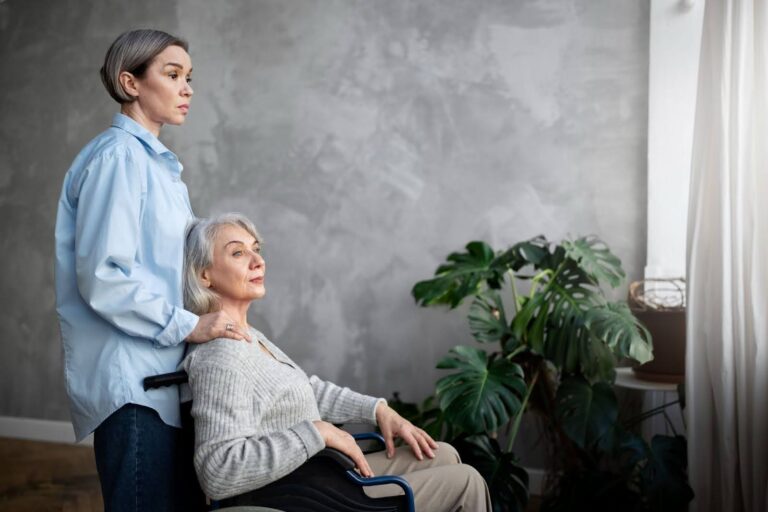If you’re preparing to care for a loved one whether it’s a parent, spouse, or friend, you may be asking yourself, “Do I need to be certified to do this?” It’s a common and important question, especially as more people step into caregiving roles without prior experience. If you’re wondering how to become a caregiver, know that it doesn’t always require formal certification.
For many family caregivers, the journey begins informally, with love and necessity. But understanding your options and the benefits of caregiver education helps you provide more confident, effective, and compassionate care.
At Zen Caregiving Project, we believe that caregiving is a deeply human act that demands presence, emotional resilience, and intention. Whether you pursue certification or not, the real essence of caregiving is in connection, not in credentials.
What Is a Family Caregiver?
A family caregiver is someone who supports a loved one with daily activities, medical tasks, and emotional care. This role can involve:
- Assisting with bathing, dressing, and meals
- Managing medications or appointments
- Offering companionship and emotional support
- Helping with mobility or cognitive challenges
Family caregivers often do not get paid, and most often they do not have formal training. Still, their impact is deep. Each year in the U.S., more than 53 million people provide care to their family members without payment.
Do You Need Certification to Be a Caregiver?
The answer depends on your role and goals. If you’re caring for a loved one at home without compensation from an agency or insurance provider, you do not need a professional caregiver certification in most states.
However, if you are looking to:
- Work professionally as a caregiver
- Receive compensation through Medicaid or other programs
- Provide care in a licensed care facility
Then certification may be required or beneficial.
Let’s explore both paths, informal family caregiving and professional caregiving certification, so you can decide what’s right for your situation.
When Is Caregiver Certification Required?
There are specific cases where caregiver certification is necessary, especially in formal or professional settings. Here’s when you might need it:
1. Professional Employment
If you want to work as a home health aide, certified nursing assistant (CNA), or staff caregiver in a licensed facility, most employers demand certification. These programs ensure that professional caregivers meet minimum standards for safety and care quality.
2. Medicaid or State-Funded Care
If your loved one is covered by Medicaid programs that pay for family caregivers, in some states, caregivers are required to complete approved training courses or meet certain competency standards.
3. Medicare-Certified Home Health Agencies
If services are being reimbursed through Medicare, the agency providing care may need to meet federal caregiver standards. In these cases, formal training is typically required for those providing support under the agency’s care plan.
Resources such as the AARP Caregiving Resource Center offer valuable guidance on caregiver support, training options, and navigating caregiving challenges.
Benefits of Caregiver Certification Even If It’s Not Required
Even if it’s not a legal requirement, it can be very beneficial to obtain caregiver education and certification. If you’re wondering how to approach caregiving so that you feel more empowered and informed, this could be a great step for you.
1. Improved Confidence
Learning how to assist with mobility, hygiene, safety, and communication helps you feel more confident as you support your loved one through physical and emotional challenges.
2. Better Outcomes
Formal training improves the quality of care you provide. You’ll gain practical tools that make a difference in your loved one’s comfort, health, and emotional well-being.
3. Professional Flexibility
Caregiver certification can open doors to future employment or flexible income opportunities through professional agencies or private arrangements.
4. Eligibility for Reimbursement
Some state and long-term care programs allow family caregivers to receive compensation, but only if they meet training or certification criteria.
How to Become a Caregiver Without Certification
If you’re caring for someone at home and don’t require certification, your focus should be on foundational knowledge and emotional preparedness. Zen Caregiving Project’s courses are ideal for this path.
Here’s how to begin:
Step 1: Understand the Needs of the Person You’re Caring For
What type of care is required? Are there mobility limitations? Is the person living with dementia, chronic illness, or recovery needs? Understanding their needs helps you tailor your education.
Step 2: Learn the Basics of Safe and Compassionate Care
This includes:
- Helping with activities of daily living (ADLs)
- Communicating with respect and empathy
- Preventing injuries and managing risks at home
- Supporting emotional well-being and grief
Step 3: Practice Mindful Caregiving
At Zen Caregiving Project, we teach mindfulness-based techniques to help you:
- Stay present in challenging situations
- Recognize and manage emotional overload
- Set healthy boundaries
- Navigate uncertainty and change
- Cultivate inner calm and resilience
You don’t need certification to show up with heart, awareness, and wisdom.
How to Become a Certified Caregiver (If You Choose That Path)
If you do decide to pursue caregiver certification, here’s what the process often looks like:
1. Research Your State’s Requirements
Certification standards vary by state. Some offer quick-entry programs while others require more intensive coursework. Check with your local Department of Health or caregiver registry.
2. Enroll in an Approved Training Program
These programs typically cover:
- Personal care skills (bathing, grooming, dressing)
- Emergency procedures and first aid
- Safe lifting and mobility support
- Infection control
- Communication and recordkeeping
3. Pass an Exam or Competency Evaluation
After completing training, you may be required to take an exam to demonstrate your skills.
4. Apply for State Certification
Submit your training records and exam results. You may also need background checks and health screenings.
5. Maintain Your Certification
Some states require continuing education or renewal every few years to keep your status active.
A Mindful Alternative: Zen Caregiving Project’s Approach
At Zen Caregiving Project, we offer a different but equally valuable form of caregiver education. Our Mindful Caregiving Education (MCE) program doesn’t result in a state-issued certificate, but it provides:
- Tools to reduce caregiver stress and anxiety
- Practices for working with grief and uncertainty
- Strategies to build sustainable compassion
- Community and emotional support
Whether you’re providing personal care or simply sitting beside someone you love, our courses equip you with presence and clarity, two of the most essential caregiving tools.
You Can Be a Caregiver Without a Certificate
If you’re wondering how to become a caregiver for a family member, you don’t need to wait until you complete a course or earn a credential. You can begin today right where you are with curiosity, love, and a willingness to learn.
Certification may be helpful for some, but it is not a requirement for being thoughtful, present, and effective in supporting someone you care about.
What matters most is that you’re there and that you’re willing to grow.
Start Your Journey with Zen Caregiving Project
If you’re exploring how to support a loved one with intention and care, our team at Zen Caregiving Project is here for you. Our courses are designed for individuals just like those stepping into caregiving with open hearts and the desire to serve well, sustainably, and mindfully.Visit ZenCaregiving.org to explore our free and low-cost course offerings and discover how to deepen your skills without pressure or complexity.


